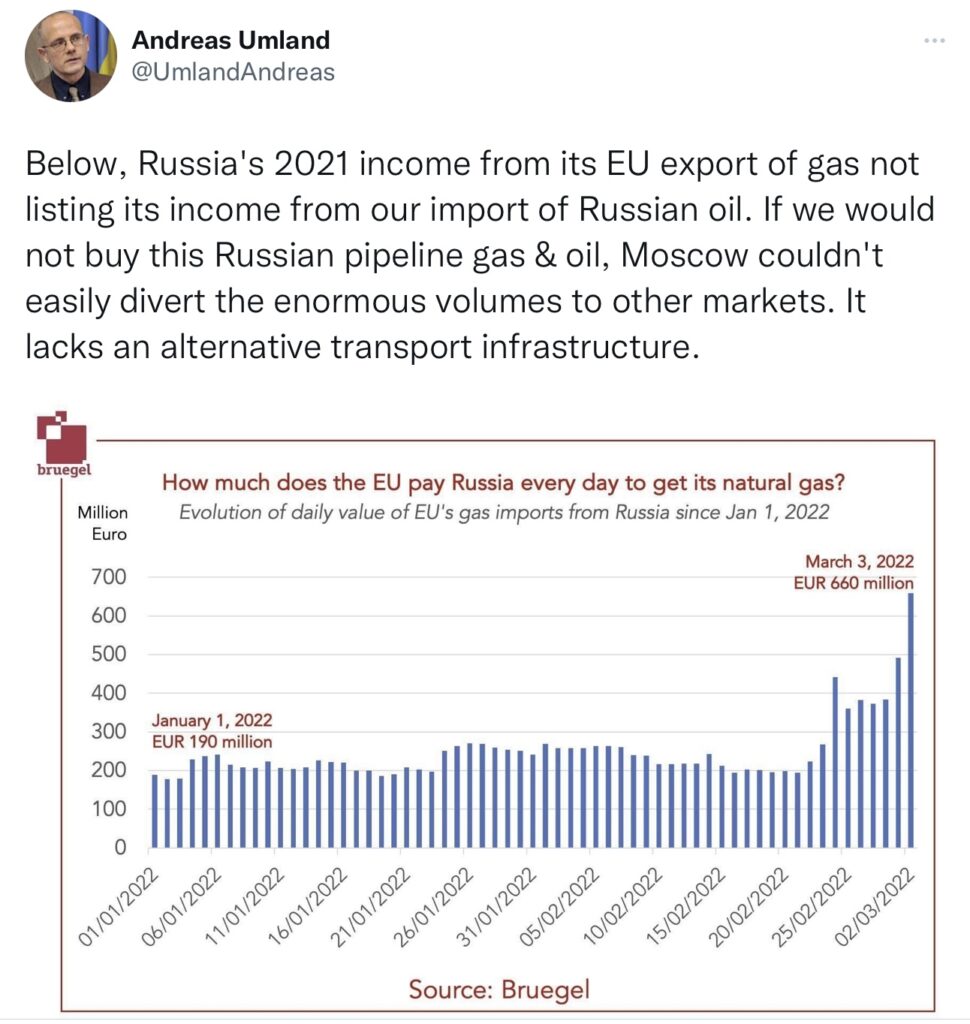The intruder

This handsome bird photographed on one of her regular visits to our garden.
She comes daily to nibble and peck under the bird-feeders, from which the Blue Tits, Robins, Great Tits and the occasional Starling dislodge fragments of seeds and peanuts.
It’s back to the future, with a vengeance
The ‘back’ in this case is 1939. The thought was triggered by an insightful piece by Neal Acherson in today’s Observer.
Putin isn’t Hitler. He will die a disappointed old nuisance in exile somewhere, rather than by Heldentod suicide in his bunker. Both men qualify as psychopathic dictators, swaddled from reality in fantasies of geopolitical revenge. But Putin’s grip on the Russian imagination is weaker than Hitler’s on the Germans. And his use of police terror against his own people, though horrifying, is distinctly less effective.
All the same, that wise historian Margaret MacMillan sees one desperately important parallel. Both men have meant what they said. And in both cases they were not taken seriously until it was too late. Hitler raved on in public about getting rid of the Jews and conquering Lebensraum in eastern Europe. But the “other Hitler”, in private, could sometimes talk quite charmingly and constructively about possible agreements. Obviously, foreign visitors concluded, the public stuff was just for show while the “serious” Hitler was revealing his real mind. Diametrically wrong! The crazy speeches gave his true intentions; the sober reflections over coffee were all lies. With Putin, the west wrote off his increasingly wild talk about breaking Nato’s encirclement and restoring Russia’s dominion over post-Soviet space. He couldn’t be serious. Under the bluster, wasn’t there still that shrewd, cautious Putin with whom one could do business? But Ukraine proves the opposite. The imperial dream is what he means. The meetings with western leaders across that long table, hinting at terms for a bargain, were all fake.
That’s why we’re back to 1939. The big difference is that there were no nuclear weapons then — which is why those of us who remember the Cuban Missile Crisis are so alarmed by the present crisis. Especially when one recalls that the two main actors in that drama — JFK and Kruschev — were both rational beings. (The irrational ones on the US side were the military, led by Curtis LeMay and Kennedy’s great achievement was to keep them under control.) But if Acherson’s parallel with Hitler is accurate, then apocalyptic irrationality may be on the cards. Indeed, one of the most important questions may be whether the Russian nuclear command would actually implement an order from Putin to launch a strike. (See this thread for some interesting commentary on the Russian chain of command.)
Putin’s been ranting that Western economic sanctions constitute “acts of war”, implying that they justify massive retaliation. But although they are doubtless inflicting pain on Russians, there is one overlooked aspect that may make them easier to bear, as Adam Tooze points out on his blog: Russian gas continues to flow into Europe,
with European customers now paying even more exorbitant prices, Russia is benefiting from a staggering surge in revenue. According to Javier Blas of Bloomberg, at the start of the year, Russia was earning $350 million per day from oil and $200 million per day from gas. On March 3 2022 Europe paid $720 million to Russia for gas alone.

So every day at the moment, Russia’s income from gas alone is $720m a day. And it’ll probably increase even more in the coming weeks. We’re in for a long haul.
Quote of the Day
”Love is not the distant moan of a dying violin — it’s the triumphant twang of a bedspring.”
- S.J. Perelman
Musical alternative to the morning’s radio news
Chad Lawson | When the Party’s Over | Live At Wigmore Hall
Given that our post-WW2 party is definitely over, I thought this might be appropriate for today.
Long Read of the Day
I Can See It (But I Can’t Feel It)
Lovely essay by Drew Austin on “the Millennial Aesthetic“ and how the Internet (and Instagram in particular) has transformed the physical world. It’s an elegant rant against “the Instagram-optimized settings that have proliferated in cities during the past decade — places that the Blackbird Spyplane blog describes as
a “high-efficiency, low-humanity kind of eatery where you point yr phone at a QR code and do contactless payment before eating a room-temp grain bowl under a pink neon sign that says ‘Living My Best Life’ in cursive.”
The world is increasingly divided between people who are addicted to Instagram and those who are not. I belong to the latter — which often surprises people, given that I’m a keen photographer. They are not convinced by my reply — that I have a life to live and work to do.
Anyway, hope you enjoy this essay.
Ukraine’s victories in the ‘TikTok war’ won’t stop the missiles
Yesterday’s Observer column:
So is the conflict in Ukraine – as some of the world’s media seem to think, the “TikTok war” – or, more generically, “the first social media war”? As Russian tanks rolled into the country, videos of frightened people huddling together, explosions blasting through urban streets and missiles streaking across Ukrainian skies suddenly replaced TikTok’s usual fare of memes, jokes, fitness and dance videos. “Ukrainian social media influencers,” reported Reuters, “uploaded bleak scenes of themselves wrapped in blankets in underground bunkers and army tanks rolling down residential streets, juxtaposed against photos of blooming flowers and laughing friends at restaurants that honoured more peaceful memories of their home towns. They urged their followers to pray for Ukraine, donate to support the Ukrainian military and demanded Russian users in particular to join anti-war efforts.” TikTok users across the country began livestreaming the war and the buildup of Russian forces, denying Vlad the Invader the ability to dominate the narrative about what was happening.
All of which is impressive. It was a light (sometimes the only light last week) shining in the darkness. What we were seeing, wrote Chris Stokel-Walker on Vice, was the “meme-ification of the Ukraine invasion”. In a networked world, this is supposedly a big deal because memes can be used to dominate the information space – now believed to be an important element of any conflict. The strange thing is that, up to now, we thought that the Russians were the Olympic champions of this stuff…
My commonplace booklet
I Booked an Airbnb in Kyiv
Lovely, imaginative act of solidarity by Alex Tabarrok. Link
This Blog is also available as a daily email. If you think that might suit you better, why not subscribe? One email a day, Monday through Friday, delivered to your inbox. It’s free, and you can always unsubscribe if you conclude your inbox is full enough already!
